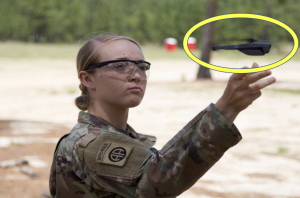US Army: $2.6 million contract for the Black Hornet mini-drones.
FLIR, as part of Teledyne, it is supplying the tiny Black Hornet, a palm-sized unmanned aircraft system, which was chosen to become the U.S. Army’s Soldier Borne Sensor, providing reconnaissance capabilities at the individual soldier level.

The Black Hornet weighs less than 1 ounce and is capable — in its current form — of flying about 100 meters high for 25 minutes with line-of-sight distances of up to 1 mile. The UAS is in a size class so small it requires no air-space deconfliction authorization to fly making it very easy to use immediately in an operation.
The company recently won an additional $14.5 million contract to provide Black Hornet to the Army.
FLIR System merging in Teledyne Technologies
The acquisition, $8.2 billion, of FLIR Systems, will allow Teledyne Technologies to be increasingly competitive in the world of unmanned and sensing capabilities.
While FLIR will be fully incorporated into the digital imaging segment with Teledyne, it will get to keep its name, going by Teledyne FLIR.
“We want to build on the strength of Teledyne, but we also want to acknowledge the strength of FLIR. And those two brands, those two technologies sets together really, really sets us apart in the market,” Roger Wells, vice president and general manager of Teledyne FLIR unmanned systems said.
He added that Teledyne doesn’t plan to spin off any of FLIR’s businesses or close down its facilities.
FLIR is contributing technology, particularly thermal imaging and artificial intelligence capabilities, to the Integrated Visual Augmentation System, a pair of goggles worn by soldiers providing intelligence during operations. FLIR also provides countless imaging and detection sensors on a wide variety of platforms throughout the U.S. military and to more than 50 countries around the globe. The company expects its technology in that department to become even better under Teledyne, according to Wells.
